In 2018, the International Cooperative Alliance’s Asia-Pacific office (ICA-AP) hosted a workshop in Guiyang, China, to ‘Re-work, Re-imagine and Re-shape’ the advancement of women CEOs in co-operatives. One of the outcomes of the event was a pledge to meet again regularly. Then came Covid. But in July 2024, the second Asia-Pacific Women CEOs in Cooperatives Summit was organised in Hanoi, Vietnam, by the ICA-AP, the ICA-AP Committee on Women and the Vietnam Cooperative Alliance (VCA), with support from the All China Federation of Supply and Marketing Cooperatives, the Japanese Consumers’ Co-operative Union (JCCU), the ILO and Agriterra. I was invited to attend the summit, to share my experience as a woman leader – and what I have witnessed through my work at Co-op News.
Women in Vietnam face a constant tension between balancing careers and independence with traditional home and caring responsibilities – while attempting to navigate gender stereotyping, bias and discrimination. And they’re not alone. The summit brought together nearly 100 women leaders from 12 countries, who shared similar frustrations and challenges around juggling the demands of work lives and home lives. But they also shared stories of immense resilience and courage, and examples of how the co-operative model has supported them as women leaders, and they, as women leaders, have supported their co-operatives.
The event’s opening evening ceremony set the scene for the following days, with a series of reflections on the expectations and experiences of women CEOs in co-operatives in the Asia-Pacific region and beyond – and an expo of products from women-led co-ops in Vietnam.
Welcoming delegates, VCA president, Cao Xuan Thu Van, gave an overview of the country’s co-operative movement, which includes over 31,000 enterprises. One of its largest sectors is agriculture, with 18,340 co-ops, although only 10% of these have women involved in management. She also described the One Commune, One Product (OCOP) programme, which boosts rural economic development and encourages women’s participation – and how the government has also implemented policies to encourage women’s participation in collective economic development and co-operatives.
Related: ICA Gender Equality Committee releases International Women’s Day statement
In a one-party communist state, co-operatives have had an important role in Vietnam’s economic development. The opening was attended by the secretary of the Communist Party of Vietnam Central Committee and head of its Commission for External Relations, Le Hoai Trung, who praised the internationalism of the event and expressed hope it would “raise community and leadership awareness about women’s contributions to the sustainable development of co-operatives”.
Also speaking at the opening were Chitose Arai (chair of the ICA-AP Women’s Committee), who emphasised the committee’s goal of strengthening the network of women co-operative leaders in the region, and Ingrid Christensen (director of the ILO Country Office for Vietnam), who praised the VCA for actively engaging in international co-operation among co-operatives and elevating the role of women.
“The ILO recognises co-ops as key to promoting gender equality, protecting workers, and achieving sustainability,” she said. “Female co-operative leaders are essential for advancing these goals.”
The theme of the summit was ‘Empowering Leadership: Shaping the Future of Women-Led Co-operatives’, with attendees exploring a broad range of subjects, from economic volatility, climate change and social justice, to self-care, stress management, and achieving a healthy work-life balance.
The social dimension of co-operatives was evidenced early on the first day, with an energetic introduction by Vasanthi Srinivasan – and a reflection on the nature of leadership. A professor of organisational behaviour and human resources management at the Indian Institute of Management Bangalore (IIM-B), Prof Srinivasan said she had specifically requested a slot at the very start of the event.
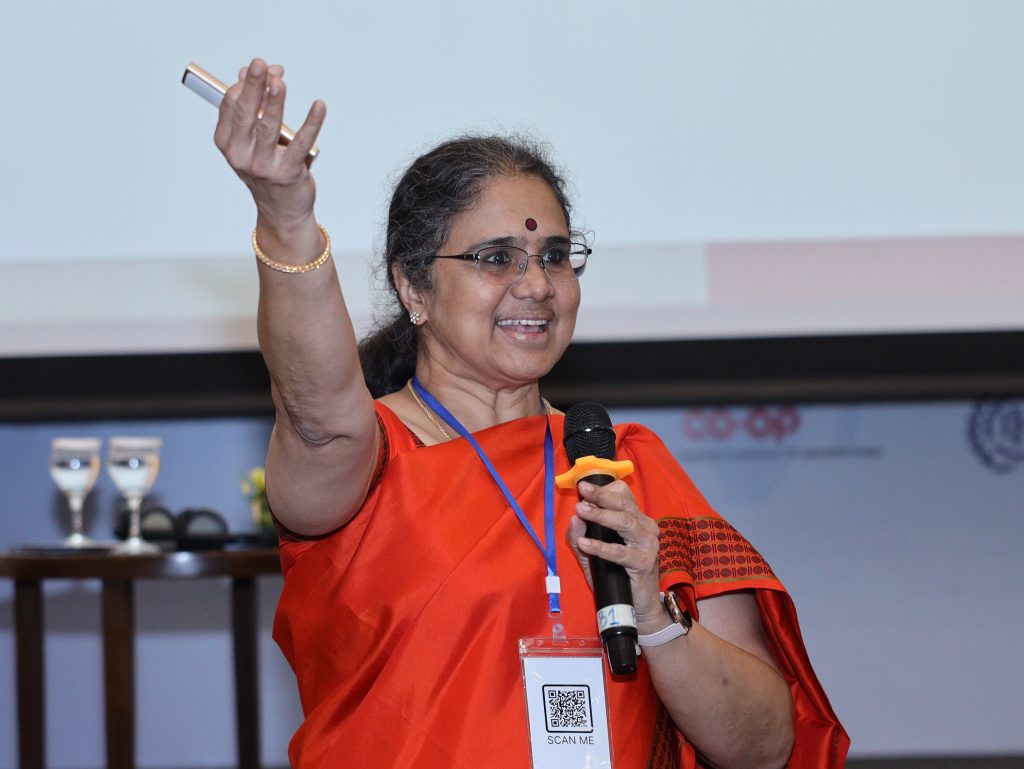
“We will be here for two days, and I’ve found that at many of these summits, we meet the same people and have so much to catch up on with our friends that we miss the opportunity to meet lots of new people,” she said, leading delegates through introductions and thoughtful contemplations on the purpose and expectations of the event.
As a leader and educator, Prof Srinivasan believes reflection is a vital part of leadership. “The higher in an organisation you are, the more stakeholders you have responsibility for,” she said. “Reflection is not just thinking, it’s mindful thinking and purposeful thinking. Every moment and interaction is a learning moment if you are reflecting … Leaders are teachers: the more you teach the more you lead, and the more you lead, the more you teach.”
Related: Research from Coop France looks at gender equality in nation’s co-ops
She added that leadership is both an art and a science, and encouraged delegates to keep in mind three questions during the summit and beyond: “What is the personal change I need to make? What is the next professional competence I need to acquire to grow my co-op? What are my key priorities for the organisation for the next three years?”
The changing nature of the world – and the need for co-ops to be resilient and adaptable – was discussed in an early panel, facilitated by Donna Dizon, vice-president – administration and corporate planning of Climbs Life and General Insurance Cooperative and CEO and principal of the Co-operative College of the Philippines.
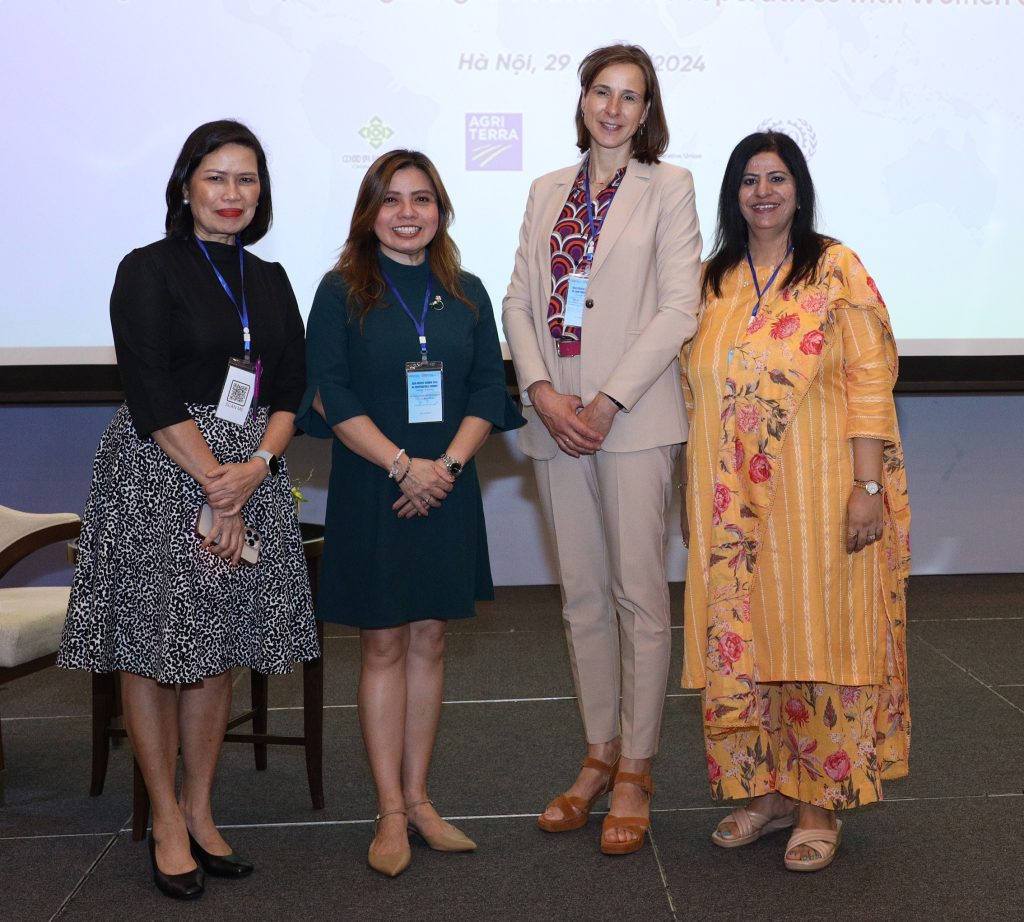
Elenita V. San Roque shared her experiences as the first CEO of the Asian Confederation of Credit Unions (ACCU), and highlighted the importance of having mentors who can “strengthen our leadership, and through that, impact other lives.” She sees this as particularly important for credit unions in areas where environment issues are impacting communities and “climate change is causing our members to become more poor”.
“Our mission is to improve the lives of people while at the same time addressing the internal challenges of credit unions in Asia.” These include an ideology crisis, tech adoption, governance issues, member engagement, ageing leadership and a lack of enabling regulatory environment – challenges which were echoed by delegates throughout the summit.
“You need your members to believe and trust there is a need for the existence of your organisation,” San Roque added. “As a leader, you need bravery and character, to be consistent, lead by example and not allow yourself to be treated as a VIP.”
Sharing her experience from India, Ruchi Agarwal (CEO, National Insurance VimoSewa Cooperative Ltd) recognised many of the same challenges. VimoSewa is a multi-state co-operative promoted by the Self-Employed Women’s Association (Sewa), and aims to provide social protection to informal sector women workers and their families.
“Climate change in particular is something that has left women behind, especially in the informal sector,” she said, but added that partnerships and member relations had been a hugely important part of addressing challenges. “It’s a fine act of balancing, trying to connect all members, making sure people don’t feel left out. To stay relevant in changing landscapes, leaders must be versatile, learn, transform and stay agile – because we live in a fast changing world.”
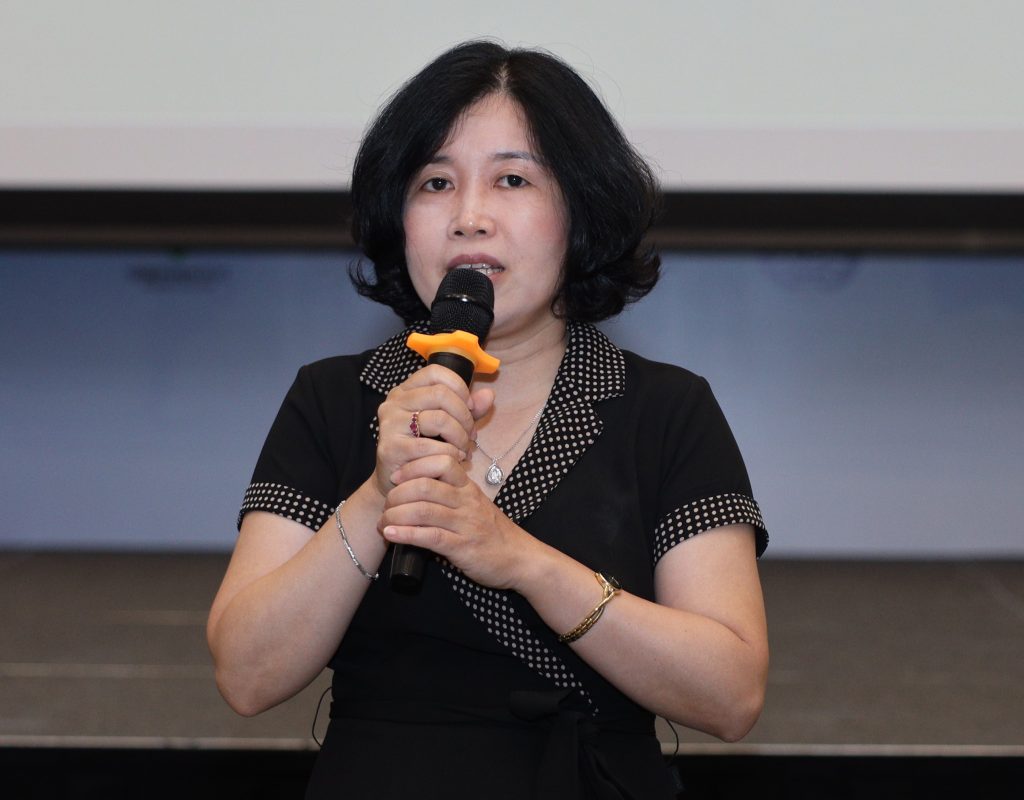
One of the sponsors of the summit was Agriterra, a Netherlands-based international agri co-op development organisation with projects all over the world, including Vietnam. Representing the organisation was Helma Vermuë, a dairy farmer from Netherlands, whose 170 cows deliver milk to her local co-op (Frieslandcampina) and who also chairs a network of women in business.
“Women wear multiple hats,” she said. “I’m a mother of four, a wife, a CEO, a chairperson, a farmer, a daughter, a sister, a friend – and each role asks another quality time after time.”
She described how in the Netherlands, women are seen as part of the solution within business, and how her aim is to see balance at all professional levels. “Men and women, young and old need to strengthen and encourage each other, and this starts by raising sons and daughters to make sure they understand equality,” she said. “Let’s not fight to take the leadership role, but lead by example. Let us not be the leader who pushes, but be the inspiring leader, who leads.”
In a separate session, delegates heard how women-led co-operatives are active in promoting inclusivity, social justice, and community welfare, and heard the personal stories of some of the women leading these organisations.
It was chaired by Priti Patel (vice-chair, ICA-AP Women’s Committee and vice-chair, Gujarat Mahila Credit Cooperative Society Ltd), who reminded delegates of one simple fact: “We should be known for our work, not our gender.”
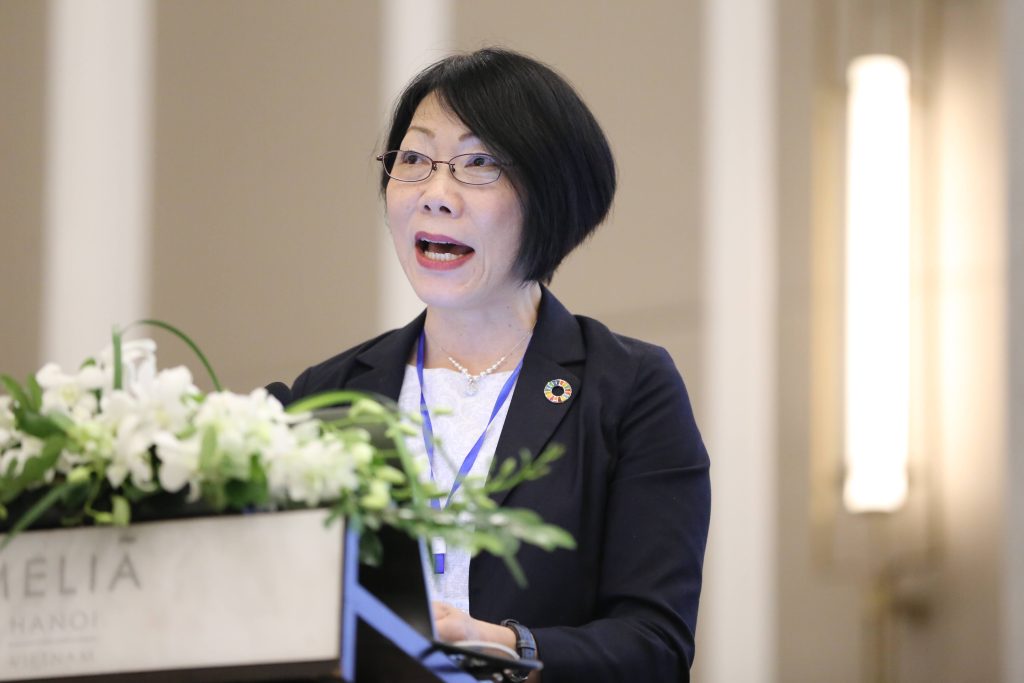
From Nepal, Chitra K. Subba, CEO of the country’s National Cooperative Federation (NCF) shared how co-ops are recognised as an economic pillar and how the country’s Cooperative Act 2017 mandated 33% women’s participation in governance – although it is still a challenge for them to reach leadership positions.
Subba joined NCF as an accountant in 1995 and in 2005, had the opportunity to participate in an ICA-Japan training course. “This was the turning point of my professional career,” she said, “and led to me taking on other responsibilities.” But she was still acting general manager of the organisation for two years before finally being granted the permanent post.
She described how NCF has launched a number of initiatives to promote inclusivity and social responsibility, including forming a women sub-committee to advocate for the equal participation of women – a move that has been replicated by other co-operatives. The apex conducts training programmes for both men and women because “both need to be equally sensitised to resolve gender issues”, and lobbies the government for gender friendly policies. But to make a real difference, she said, “co-ops need to create an enabling environment to increase women’s competency, confidence and capabilities, and promote women’s success stories to motivate others.”
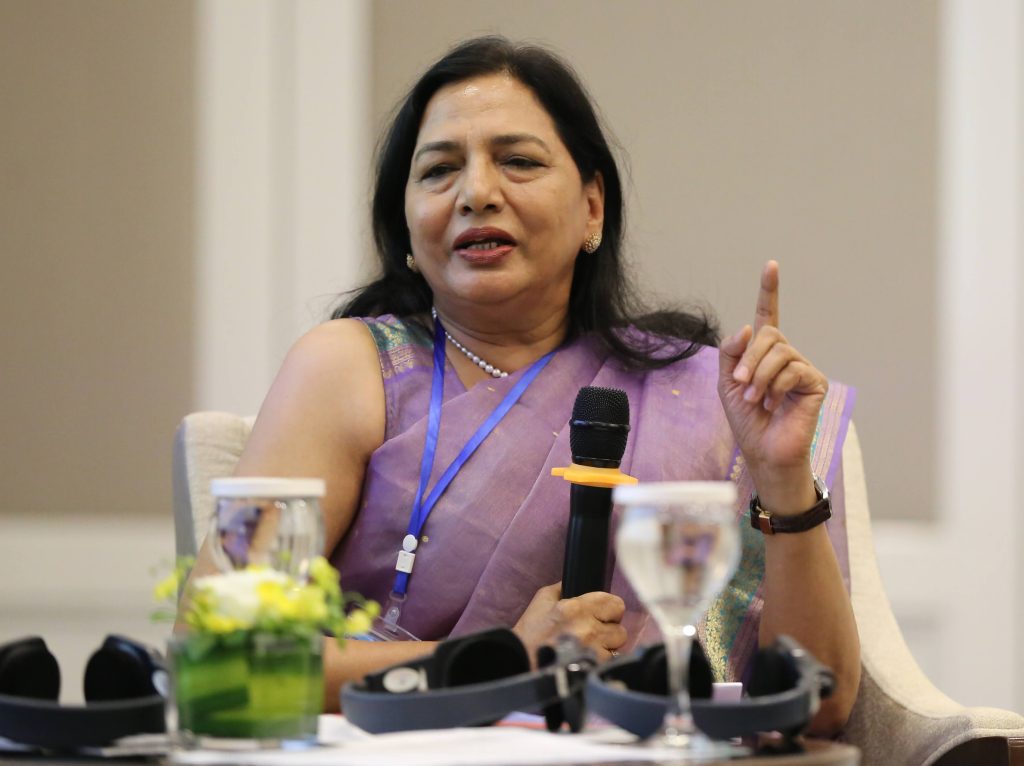
Miho Takaura, managing director of Co-op Hiroshima, Japan, also experienced barriers to promotion because of her gender.
“Most of the members of Japanese consumer co-ops are women, and most of the member directors are also women. But only 7.6% of the executive directors are women,” she said. In 2023, Japan ranked 175th out of 188 countries in terms of the proportion of women in managerial positions “We need a shift in our approach to diversity and inclusion.”
She described how in Japan, promotions “are often based on seniority, based on years of service and age.” Because of this, maternity leave can often hinder career progression – particularly as “the period of childbirth and childcare often coincides with the times of promotion to positions like section chief or assistant manager.”
Japan is seeing a low birthrate and ageing society, alongside a population and workforce decline; Takaura believes that to address this, there needs to be a rethink around “how to establish fair systems for education, career planning, evaluation, and promotion” – alongside the need to recognise maternity and childcare leave as valuable for professional development and adding these periods to the total years of service.
Vu Thi Thu Huong, vice president of the Thai Nguyen Provincial Cooperative Alliance, Vietnam, shared a similar story, giving the examples of co-ops working in tea productions, credit provision and transport in the Thai Nguyen region. “Women-led co-ops are good for other women, too. They make connections, are more socially inclusive and provide more employment opportunities for other women.”
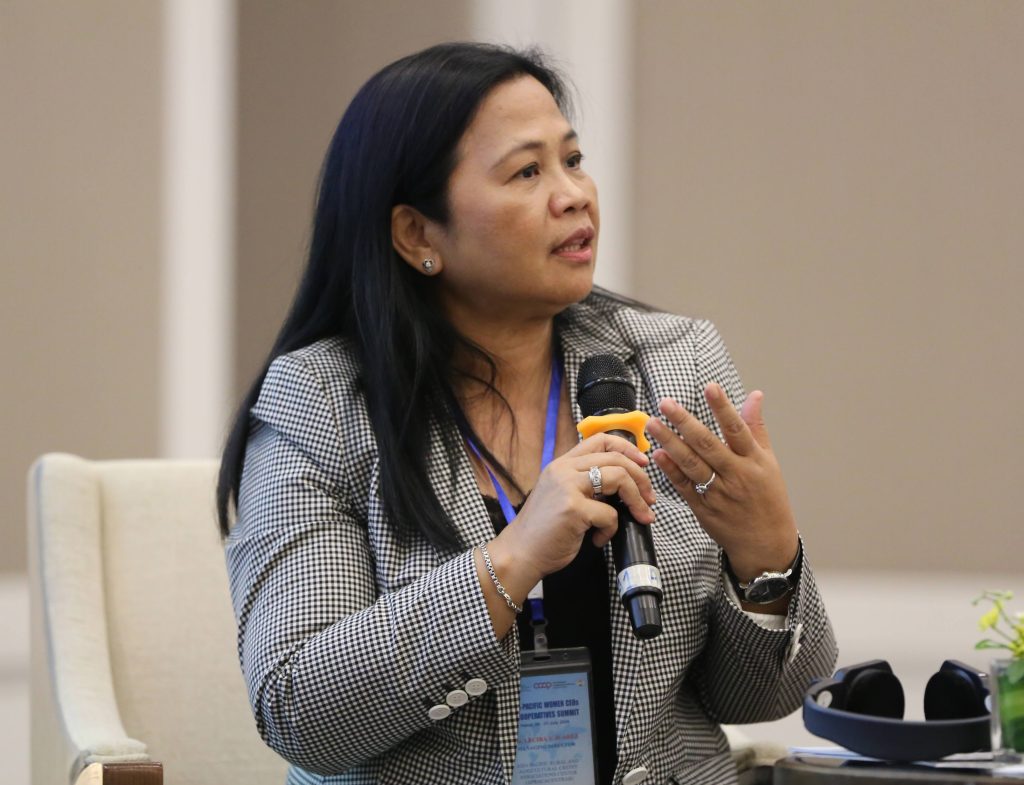
A recurring theme at the summit was the importance of self care: how do women leaders achieve a healthy work-life balance, when globally, many domestic duties still lie with women? In a session chaired by the ILO’s Ingrid Christiansen, co-op leaders shed light on their co-op journey as a woman leader – and how they balance their professional and personal lives.
For Chitose Arai, the key is having the ability to “switch between on and off time” and surrounding yourself with a good team.
In 1999 her co-operative was looking for activity leaders. “My daughter was about to start kindergarten and I wanted to go back to work, and someone said I should apply,” she said. For her, teamwork was key from the start. “You don’t need to struggle by yourself; consult others.”
Savitri Singh, deputy CEO, National Cooperative Union of India (NCUI), also sees wider support as vital. “If a woman has an unsupportive family, it is very difficult,” she said, describing how always wanted to work. Her father wanted her to get married, “but I never gave up on my ambition to be a working person.” She had a very supportive husband “who never questioned when I worked late” and also employed people to help at home, to ensure her wider extended family was looked after well.
This support extends to the workplace, too. “Divide your work with colleagues. Delegate. Consult with your teams, and use them gratefully and appreciatively. Don’t struggle by yourself.”
Lecira Juarez, managing director, of Asia Pacific Rural and Agricultural Credit Associations Center for Training and Research in Rural and Agricultural Banking (APRACACENTRAB) in the Philippines joined the co-op movement at a very young age, out of necessity. “I started early because of a need, and that became the foundation of how I appreciated the dignity of co-operation,” she said. Both her parents died when she was young. “I was told: ‘did you know your mother was a co-op member? You can receive help! I went back to the co-op age 18 to start work, and by age 24 I was the youngest person in a board room all filled with men.”
While the majority of the speakers were women, a session on mentorship was chaired by ICA-AP’s Balu Iyer, who highlighted how the organisation was committed to providing a platform for women CEOs to listen, share, network and mentor each other.
“Leaders are teachers,” he said, echoing Prof Srinivasan. “We don’t just become leaders overnight, it’s a process, and this journey is how we learn to equip ourselves to be in the position we end up in.”
He explained that ‘mentoring’ was chosen as one of the summit topics because at the 2018 event it was pointed out that when it comes to men, they usually have a good mentor they can call and reach out to; a survey showed that this is lacking for women CEOs.
Samadanie Kiriwandeniya, managing director, at Sanasa International, Sri Lanka, described how mentors can come from many places and for her, her mother and father were key to her co-operative journey.
“Every one of you here is a potential mentor,” added Ang Hin Kee, CEO of the Singapore National Co-operative Federation (SNCF), Singapore. He described how in his experience, “people don’t care how much you know, until they know how much you care … but also a co-operative cannot depend on charity, care and love to deal with challenges,” he said. “It needs to be sustainable, profitable. So both men and women leaders need to balance this.”
Dulce Bustamante, executive director of the Union of Legitimate Service Contracting Cooperatives in the Philippines and chair of the ICA-AP Committee on Youth Cooperation, said young people could learn a lot from experienced co-operators and what keeps them committed to co-operation, but that younger people can be committed and engaging leaders too.
She notes that women and young people are heard more, “but we need to be engaged more, too,” she said. “We need to work together to achieve a society where we don’t look at age or gender any more.”
Particular thanks to ICA Asia Pacific (especially Balu Iyer, Simren Singh and Shivali Sarna) for providing the opportunity to participate in and speak at this event

